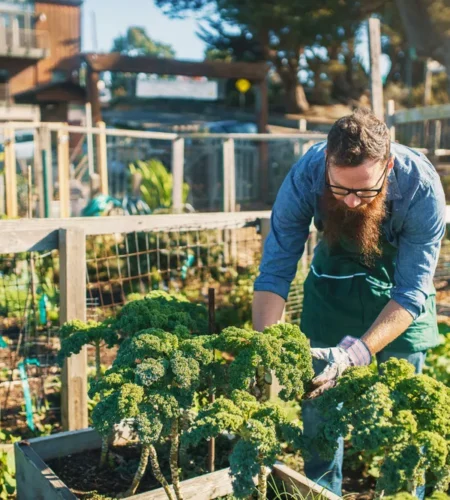Urban gardening is more than just a trend—it’s a movement toward sustainability and self-sufficiency. Even in the heart of the city, you can grow your own food and enjoy the benefits of fresh, homegrown produce. Here’s how to get started with urban gardening, including tips on starting small, understanding seasons, and sharing your bounty with friends and family.
Space is often the biggest challenge for urban gardeners, but even the smallest balcony or windowsill can be transformed into a green oasis. Container gardening is a great option for limited spaces. Use pots, buckets, or even old tins to grow your plants. Vertical gardening, using wall-mounted planters or hanging baskets, maximizes space and adds a touch of greenery to your walls.
Choosing the right plants is crucial for success, and it’s wise to start small. Begin with easy-to-grow herbs like basil, mint, and parsley, which thrive in small pots and are perfect for beginners. Leafy greens such as lettuce, spinach, and kale grow quickly and can be harvested multiple times. Tomatoes, peppers, and strawberries are also excellent choices for container gardening. Selecting compact or dwarf varieties suited for small spaces ensures better growth and easier management.
Understanding the seasons is vital for urban gardening. Different plants have different growing seasons, so it’s essential to know when to plant and harvest. For example, leafy greens and herbs often do well in cooler spring and fall weather, while tomatoes and peppers thrive in the warm summer months. Research your local climate and growing season to plan your planting schedule accordingly. This knowledge helps you optimize your garden’s productivity and ensures you get the most out of your space.
Soil quality is essential for healthy plants. You’ll want a high-quality potting mix that helps with good drainage and nutrients. Adding compost or organic matter improves soil fertility and supports plant growth. Regular watering is crucial, especially for container plants that can dry out quickly. Keep the soil consistently moist but not waterlogged to promote healthy roots.
Sunlight is another critical factor. Most vegetables and herbs require at least six hours of direct sunlight per day. If your natural light source is less than desirable, you may want to think about using supplemental grow lights. Position your plants to receive maximum sunlight exposure, and rotate them regularly to ensure even growth.
Pest management is part of the gardening process. Urban environments can attract a variety of pests, but there are eco-friendly ways to keep them at bay. Use natural predators like ladybugs to control aphids, or apply neem oil as a non-toxic pesticide. Regularly inspecting your plants for signs of trouble helps catch problems early and keeps your garden healthy.
Urban gardening is not just about food production; it’s also about community and connection. One of the most rewarding aspects of growing your own food is sharing it with others. Whether you’re giving away fresh herbs to neighbors or providing family and friends with homegrown vegetables, your garden can become a source of joy and generosity. This not only helps reduce food waste but also strengthens your relationships and fosters a sense of community.
Starting an urban garden is a rewarding endeavor that brings fresh produce and a sense of accomplishment. With a little creativity and effort, you can transform even the tiniest urban space into a flourishing garden. Begin with small, manageable steps, understand the growing seasons, and share your harvest with those around you. Urban gardening is a journey toward sustainability and connection that benefits you and your community.
By integrating these practices into your urban gardening efforts, you can create a productive, beautiful, and rewarding space that not only feeds you but also enhances your urban environment. Whether you’re a seasoned gardener or just starting, the joy of growing your own food is a fulfilling and sustainable way to live in the city.


